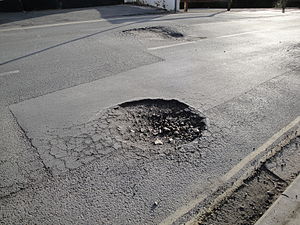The Liberal Democrat Group on Oldham Council have tabled a motion for discussion at the next full meeting (7 November 18) of the Council calling for greater action in tackling damaged road surfaces that represent a danger to motorists, cyclists and pedestrians. This is part of an ongoing Liberal Democrat campaign to raise the dangers of poor road surfaces with the current Labour Administration and to call for a change in policy so damage can be repaired if it is dangerous.
The Deputy Leader of the Liberal Democrat Group, Councillor Chris Gloster, is proposing the motion: “This issue is of great concern to Liberal Democrat Councillors on Oldham Council. My Shaw colleague, Group Leader Councillor Howard Sykes, has written to the Council Deputy Leader about this and my Crompton colleague, Councillor Dave Murphy, raised it as a question at last Council. We are just not satisfied by the lack of action so have decided to bring our proposals for proper debate at full Council. Put simply, we want the Council to be able to repair any road surface that is dangerous, not just those roads where surface erosion is at least forty millimetres deep. At the moment the Council just says no if the holes are less than 40mm.”
Government guidance issued to all local authorities in November 2016 states that Councils must ‘investigate’ instances where road surfaces have been eroded by at least 40mm, but there is no legal requirement placed upon Councils even then to repair them promptly. In Oldham, the current Labour Administration policy is to only consider potholes deeper than 40mm to be eligible for repair. By way of constant, the threshold for the repair of pavements is lower at 25mm.
Councillor Gloster explained why this is problematic: “One practical issue is that many roads in my own district of Shaw and Crompton do not even have a top surface that is 40mm thick; they can be worn away to the cobbles and present a real danger to cyclists and motorists, but as the ‘threshold’ can never be reached no action is taken. This cannot be fair or right.”
The Liberal Democrats want the Council to ensure that any road surface that becomes hazardous can be repaired. Councillor Gloster added: “I fully appreciate roads will still have to be prioritised and not all will be able to be repaired with the resources the council has, but we should look to address the danger that any worn road surface represents to the public, and not simply operate to some arbitrary ‘threshold’.”
The motion is being seconded by Councillor Gloster’s colleague, Saddleworth Liberal Democrat Councillor Garth Harkness, who said: “Another issue addressed in our motion is the lack of real finance made available to local government from central government for road repairs. This present government talks a lot about the additional resources given from time-to-time to local authorities to tackle the backlog, but this is never enough and it is always too late.”
“The Local Government Association, which represents Councils of all political persuasions across the country, has estimated that there is a £9 billion backlog of repairs on Britain’s roads. We want the government to give local authorities some of the Road Fuel Duty that is raised so we can get on with the job of making our roads fit-for-purpose.”
Notes motion reads: Oldham Council 7 November 2018 – Notice of Opposition Business – Motion 2 – Tackling Dangerous Potholes
This Council notes that:
- Residents are greatly concerned by the unsatisfactory state of highways and the prevalence of dangerous potholes in our Borough
- Elected members are aware of these are high-level public concerns because of the many complaints they receive from their constituents on these matters.
- Poor road surfaces and footpaths also harm the reputation of Oldham Council and the Borough, and can lessen the appeal of coming into the borough by these routes.
- The guidance issued to all local authorities by the Department of Transport in October 2016 required Councils to ‘investigate’ any potholes or instances of road surface erosion of at least 40mm depth, but did not necessarily require them to repair it.
- The threshold fails to take account of circumstances in which the top surface of a road is less than 40mm in the first instance, which can lead to this surface becoming completely eroded and dangerous to pedestrians, cyclists and motorists, yet ineligible for repair by a local authority under the Department of Transport guidance.
- The threshold for the repair of public footpaths is much lower at 25mm.
- The Local Government Association has estimated that there is a £9 billion national backlog of repairs to potholes and damaged road surfaces.
This Council reaffirms its commitment to:
- Ensure that any pothole or eroded surface, whatever the level of damage, which poses a danger to pedestrians, cyclists and motorists is repaired as quickly as possible
- Fight for greater resources from Government to tackle the road repair backlog.
Council therefore resolves to:
- Repair any pothole or eroded road surface within the Borough that represents a danger to members of the public, regardless of whether the arbitrary threshold of 40mm is met
- Ask the Chief Executive to write to the Secretary of State for Transport:
- Supporting the call of the Local Government Association that a significant portion of the Road Fuel Duty raised by the UK Government be allocated to local authorities to enable them to tackle the estimated £9 billion backlog
- Requesting the guidance issued to local authorities be revised to place an emphasis upon the prompt repair of any pothole or road surface representing a danger to the public.

